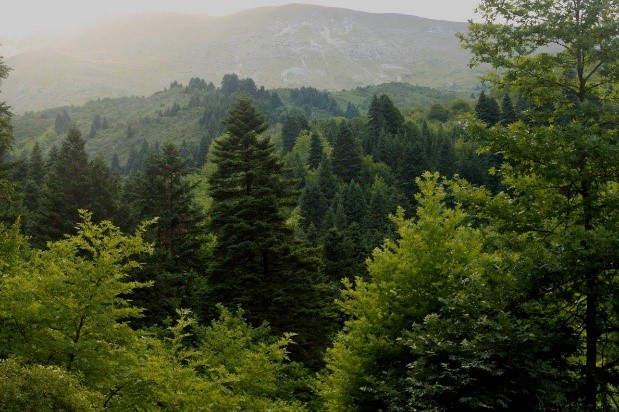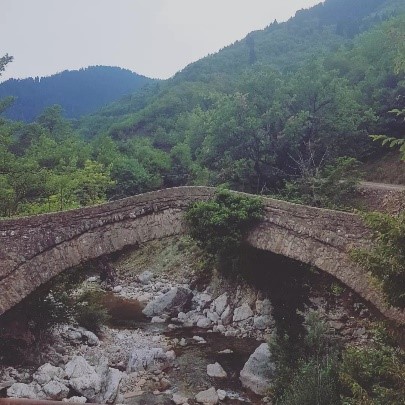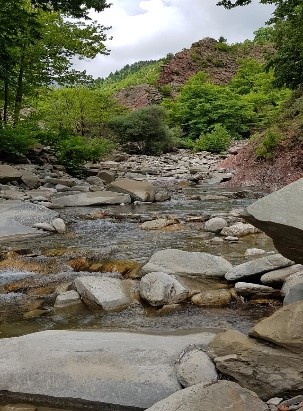Trovato
The remote village of musicians hidden in Greek mountains
PhD candidate Salti Theodora

Trovato is a remote mountain village in Greece located at an altitude of 1060 meters in the wider region of Agrafa. It is my father’s birthplace and the place that I consider my village. There are many theories of its name origin, but I tend to see connections with the Italian word “trovatore” which means a professional poet and singer who usually wanders, or the verb “trovato” which means a well-made place “found”. As a child, Trovato and its myths grabbed my attention and it was a place I would visit with my dad several times during the year, especially in the summer months. The place where the “wolves dance” or myths about Niala (which is the highest mountaintop of the area rising at 2000m above sea level) awakened my imagination and connected me with my creative self.
There I would spend hours exploring and hiking, swimming in the streams of cold water, playing in nature, enjoying its endless green and starry nights, or wandering around and walking on the old stone bridges. There I created stories and dramatizations but also painted on stones and made crafts with natural materials found in the surroundings. The pictures below, taken by me, aim to transfer the reader to Trovato’s beauty and create a sense of its atmosphere.



What I loved the most was listening to shepherd’s flute music and dances almost every summer night, when the villagers return to the village to meet each other. We call this “antamoma” which means a gathering with dance and singing festivities celebrating our tradition and origins.
Geographic Remoteness
What does remoteness mean? Is it only a geographic-related term?
Previous researchers describe the phenomenon of urbanization as a movement of people leaving rural areas due to employment opportunities and economic possibilities which are wider in bigger cities. At the same time, students who live in mountain rural areas often need to leave their communities or travel long distances in order to continue their studies to secondary or high school education. This also happened in many of the remote mountain villages of the Agrafas region. Some villages, like Trovato, started being abandoned due to richer job and education possibilities offered in other places. This led many of the local public primary schools to close down. Following this chain of events, having the schools closed, the few families with children remaining in the village had to leave. My dad left the village at the age of thirteen.
As it is seen in my research, researchers like Blandón et. al. in 2020 mentioned that the growth of large European cities has caused depopulation in rural areas and activation of possible solutions that will bring life back to rural areas is essential. García-Casarejos and Sáez-Pérez in 2020, supported the collaboration between universities and remote villages to bring life back to rural areas. This contributes to the sustainable viability and rural development of remote communities which are at economic and social risk.
My study’s intention is to contribute to the movement of bringing people back to remote villages, hoping to open a path for further collaborations between universities and remote villages, contributing to their sustainable viability. More specifically, my study is place-focused and aims to investigate the interactions among a group of six early childhood education university students from the University of Ioannina, Greece and Trovato’s natural and cultural elements. These interactions will be activated and observed through arts. Furthermore, my study’s intention is to contribute to previous research regarding the role of arts in higher early childhood education programs and research gaps in relation to the value of out-of-university pedagogical environments (such as remote mountain villages) in higher education teaching programs.
Metaphoric remoteness and the role of arts
“When we are absent from ourselves, then everything is missing”
says Werther in The Sorrows of Young Werther, a novel written by Goethe, in 1774
Due to the inspiration I received from this village as a child, and my background in arts, arts will be strongly used in my study. The interactions between students and physical spaces will be activated and observed in a series of five arts-based educational actions - three hours each- which combine drama- and art education. My research follows an Arts-based Educational Action Research approach (ABEAR), which is a research method initiated by myself based on previous Arts-Based Action Research methodologies initiated by the University of Lapland and my department.
The participants will be invited to meet the natural and cultural elements of this mountain village, but also be introduced to the village's history, nature, and tradition, through arts-based education and outdoor physical activities. They will be invited to re-consider the multiple meanings of remoteness while exploring through and in arts and interacting with the physical environment.
Are we “remote” from our bodies, our souls, the meaning of our life, or our inner self?
Could nature in a remote rural environment help us understand remoteness at different levels than geographic? Could arts help us explore the world around us and ourselves, getting to know the surroundings and ourselves better? These are the issues of reflection in my study.
What follows is a picture of Niala, taken the previous summer, 2022, while hiking with my dad towards it. I will close this post with a Jack Kerouac quotation as found in his book, On the Road, 1957, hoping to motivate my readers to wonder about issues of remoteness and re-connection both with ourselves and nature.

“Because in the end, you won’t remember the time you spent working in the office or mowing your lawn. Climb that goddamn mountain.”
Born in 1992, Salti Theodora currently holds a position as a doctoral candidate at the University of Lapland, specifically within the Faculty of Art and Design. She has a prior history of internship experience as a research assistant at the same institution. With a background rooted in drama and early childhood education, she successfully completed a Master of Science in Educational Research from the University of Gothenburg in Sweden. Notably, her expertise encompasses specialized areas, including pedagogical environments, art pedagogical leadership (pedagogista), and art education (atelierista), all interwoven with the principles of the Reggio Emilia pedagogical philosophy.
This blog entry was written as an assignment for the course TUKO1111 Writing in English (now titled TUKO1112 Research writing) and offered on a regular basis by the Graduate School of the University of Lapland.